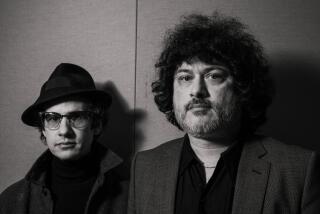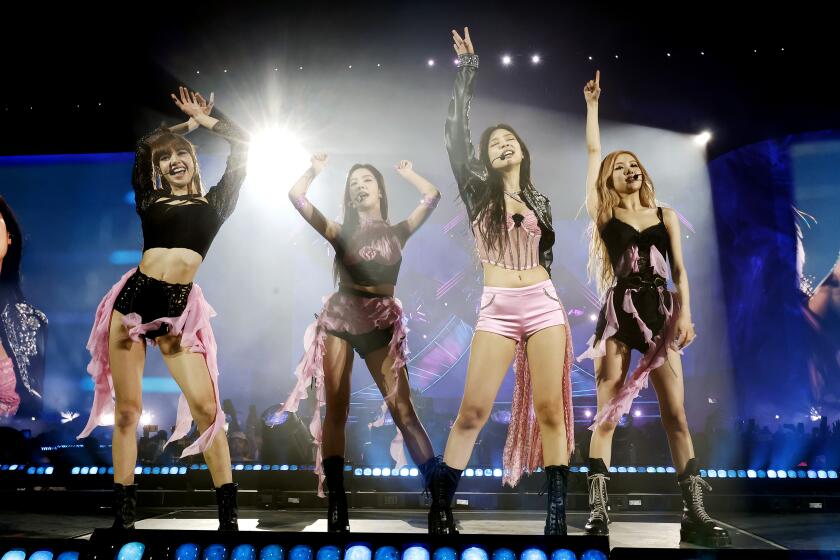Brandy on new music, being ‘brave’ and why we’re still obsessed with ‘90s R&B
- Share via
It can be easy for those without a finger on the pulse of R&B to overlook Brandy’s influence.
Yet she helped define the genre’s ‘90s golden age and carried it into the new millennium alongside singular divas such as Aaliyah and Monica. Still, she hasn’t had a crossover hit in 15 years.
Brandy’s blend of hip-hop soul and contemporary R&B paired with her richly unique tone turned her into a multifaceted pop star: She anchored a major sitcom, had a line of Barbie dolls, became the first black singer to be the face of CoverGirl and the first black woman to play Cinderella in a film.
Rihanna, Sam Smith and Ariana Grande have credited her as an inspiration, and Solange famously beefed with a music critic over Brandy’s modern work (the row inspired a song on Solange’s recent and acclaimed album, “A Seat at the Table”).
Additionally, Brandy’s hits have recently been re-imagined as pop dreamscapes and house jams by the likes of Shy Girls and 99 Souls, and have also been sampled by Drake.
It’s that continuing influence that underscores the inaugural Soulquarius festival, which is set for Saturday at the Observatory Grounds in Santa Ana. Billed as “an R&B Jam,” the sold-out blowout celebrates nearly every era of the genre with Brandy part of a lineup that includes Erykah Badu, Monica, Mya, Ashanti and Jhene Aiko.
Ahead of the festival, and a co-headlining sideshow with Mya at the Novo on Friday, we checked in with Brandy.
Nineties R&B seems to be having a resurgence, and many younger artists today have cited you as a direct inspiration. What do you think it was about that time that so many revere?
The ’90s was a very special era. It touched a lot of people. You know it’s a special era when there are circumstances that go with the song that you love. A certain song, a certain lyric can take you back to a time and a place.
That’s magnetic and magical, and I think people are craving that now. The ’90s was a state of mind, and it’s [been] on its way back. For myself, going forward … I’m not going to do anything that’s not true to me in my music or true to myself and my era. I want to try to still modernize it and make it relevant for everyone.
You’ve mentioned the new you is about being more brave. Considering your career so far, what does that mantra mean to you?
Well, I think it’s humility at the end of the day. It’s staying in the moment. Everything that I have accomplished has required me to be brave. Every single thing. So I want it to be my approach now that I have a little bit more wisdom under my belt and more experience. I want to hold myself accountable to face my fears and not have an ego. This is not about me, I’m just a vessel. And I have to stay humble for that.
What’s going on with new music?
Right now I’m doing a lot of my writing. I have so many songs that I’ve written and been working on and in the process of finishing. I like this process, I’ve never done it this way before -- just writing my music first before I even go lay anything down.
Last year you were entangled in litigation with your label. Moving forward do you plan on pursuing another deal with a major?
I’m living my dream. The one thing that was really holding me back [was] that my dream was in another person’s hands. I’m just waiting patiently for the right timing for everything that I have planned for myself and my vision.
It sounds like you plan on going the indie route.
I want to know what it feels like to just do things on my own. I want to experience what that feels like. It’s time for new ways to experience things for me. I’ve done the label thing, I’ve done the slave thing — I’ve done that. I want to know what it feels like to just be accountable for myself and my creativity of my music. I’m looking forward to that.
This year marks the 20th anniversary of your groundbreaking role in “Cinderella.” Do you think we’ll ever see another multicultural re-imagining like that?
[The 1997 version] showed you humanity. It made you colorblind. At that time naysayers would say, ‘We don’t know if it’s going to work … you shouldn’t do it.’
But [ABC] took a shot at doing something monumental. You had a young African American lady with braids in her hair as Cinderella. Just that alone was brilliant. Everyone was multicultural. You could just see the differences of humanity reflected in this entire cast and I think if someone really believed in an idea like that in today’s time that it could definitely work. It worked then.
I think it’s something we all want to see again. We just need someone to create the great idea and believe in it.
See the most-read stories in Entertainment this hour »
For more music news follow me on Twitter:@GerrickKennedy
More to Read
The biggest entertainment stories
Get our big stories about Hollywood, film, television, music, arts, culture and more right in your inbox as soon as they publish.
You may occasionally receive promotional content from the Los Angeles Times.











